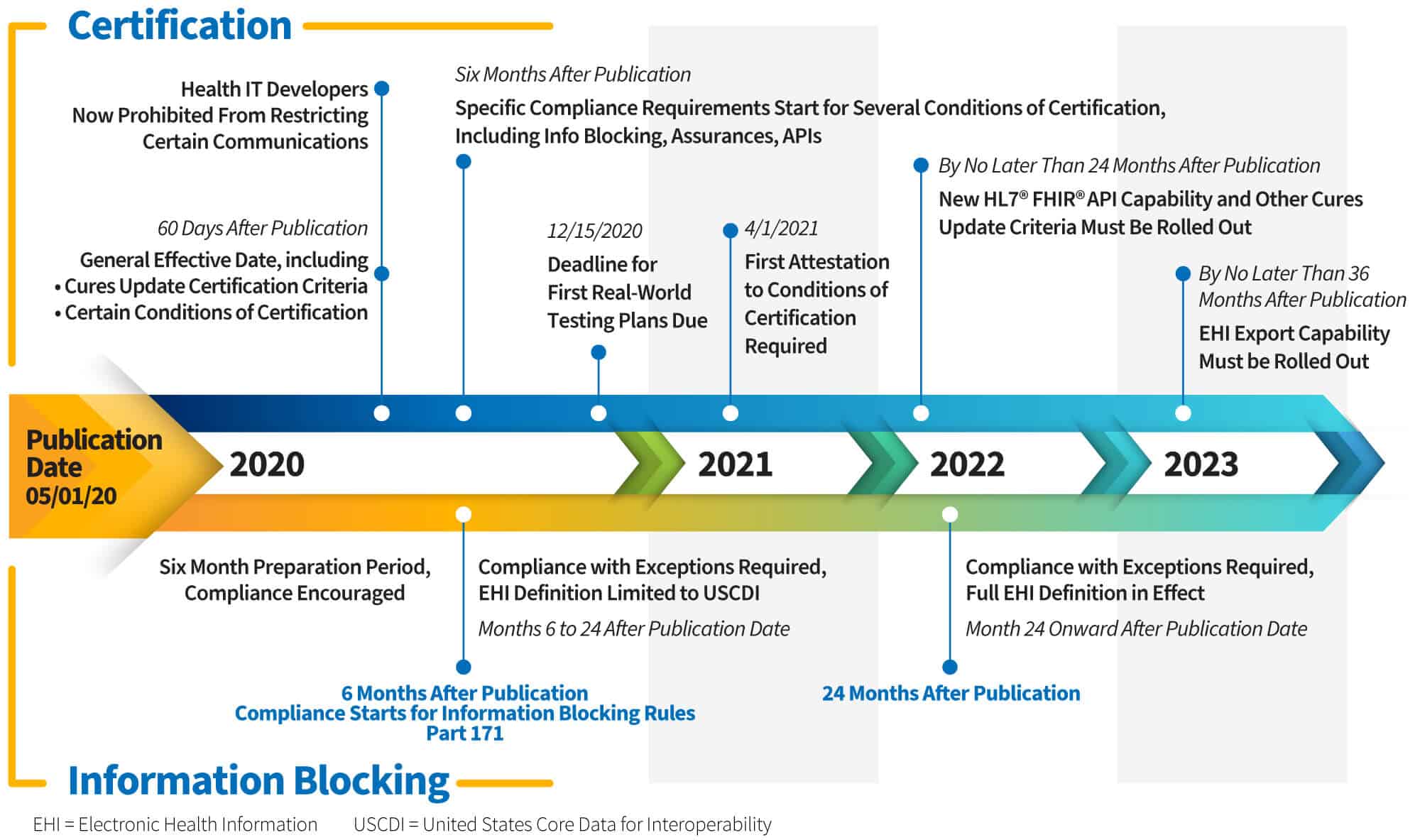Part 2
(Part 1 | Part 2)

On March 9, 2020, both the Centers for Medicare & Medicaid Services (CMS) and the Office of the National Coordinator for Health Information Technology (ONC) published final rules that govern interoperability in the US healthcare landscape. The rules include directives on:
- Patient access to data
- Electronic health record (EHR) certification criteria
- Data exchange
- Information blocking
This mandate is a part of a larger effort known as the 21st Century Cures Act, which places the patient at the center of a value-based healthcare system by authorizing patient access to their own health records directly from providers and payers.
In Part 1, we broke down what SMART and FHIR are, how the two work together, and the fact that the CMS and ONC rules will require using SMART on FHIR and FHIR R4 for data transfer from EHRs. In Part 2, we have compiled all the important information you need to know about these CMS and ONC rulings.
The Rules
These latest rules aim to enable patients to access their medical information directly and freely from their providers’ systems in electronic format. They also define what information has to be available (while ensuring transparency, security, and privacy) and outline penalties for information blocking and non-compliance.
The CMS Interoperability and Patient Access Final Regulation is about improving access to clinical and claims data. Using FHIR APIs that enable patients, health insurance plans, and federal agencies to share data patients can make better healthcare decisions.
The ONC Interoperability and Information Blocking Final Regulation focuses on enforcing aspects of the 21st Century Cures Act (interoperability, data access, and exchange/electronic health information (EHI)) and addresses the consequences of information blocking. Like CMS’ ruling, the ONC’s regulation also has requirements for APIs to use the FHIR standard, enabling patients to use APIs for free access to all of their health information. The ruling also contains important changes to the certification program that requires healthcare vendors and application developers to update existing technology.
The first impact of the CMS rule is the patient-authorized exchange of data through FHIR R4 and SMART on FHIR compliant APIs. Specifically, federally-funded insurance plans need to expose claims data via FHIR APIs by July 2021.
These insurance plans also have to participate in payer-to-payer data exchange using U.S. Core Data for Interoperability (USCDI) identified data fields. This data exchange is necessary to support use cases where a patient switching health plans is still able to move data between the payers.
Who Does It Affect
These rules impact patients, clinicians/providers, payers, vendors, developers—everybody in a healthcare ecosystem.
Patients Can:
- Access all their EHI without charge
Payers must:
- Implement a patient access API and a provider directory API
- Facilitate data exchange between payers using data identified in USCDI
- Increase the frequency of federal/state data exchanges
- Expose claims data via FHIR so that if a patient changes their health plan, they will be able to move data between the payers
Providers must:
- Update their digital contact information (in the National Plan and Provider Enumeration System (NPPES)) and/or information blocking. Failure to do so will lead to public reporting, which will affect provider performance metrics
- Improve ADT event messaging to meet care coordination requirements, allowing providers identified by the patient to receive the necessary notifications for treatment and care coordination (although CMS and ONC have yet to identify a standard for content format or delivery)
When Does It Take Effect
The Office of the National Coordinator for Health IT has provided a high-level timeline on compliance with the ONC’s Cures Act Final Rule.

Check for updated compliance deadlines. They are subject to change due to COVID-19. Source: ONC’s Cures Act Final Rule Highlighted Regulatory Dates, retrieved June 11, 2020
Due to the COVID-19 pandemic, ONC and CMS have delayed all Enforcement Discretion Date requirements by three months after the compliance timeframe. Compliance Date requirements have also been delayed by varying degrees. Information is available on The Office of the National Coordinator for Health IT’s website.
How J2 can help
Named Best in KLAS for Technical Services in 2020, J2 has experience implementing FHIR at key clients in the healthcare industry, ranging from EHR app development to enabling FHIR messaging for payer organizations.
J2 can help you meet CMS and ONC deadlines. We want to hear about your organization so we can discuss how these new rules apply to you. Drop us a line to learn more.
Resources
CMS interoperability and patient access final rule. (2020, April 21).
Cures Act Final Rule: Enforcement discretion dates and timeframes.
References
Final CMS interoperability regulation: What you need to know. (2020, March 19). Retrieved June 11, 2020
Franco, M. A. (2020, March 17). ONC, CMS finalize transforming interoperability and patient access to data rules. Retrieved June 11, 2020
Hatt, N. (2020, March 09). What you need to know about the new ONC and CMS healthcare interoperability and information blocking rules. Retrieved June 11, 2020
Highlighted regulatory dates fact sheet [Digital image]. Retrieved June 12, 2020
Johnson, T. A., & Van Lenten, C. E. (2020, April 22). CMS and ONC delay enforcement of final interoperability rules due to COVID-19. Retrieved June 11, 2020
ONC’s cures act final rule highlighted regulatory dates. Retrieved June 11, 2020


